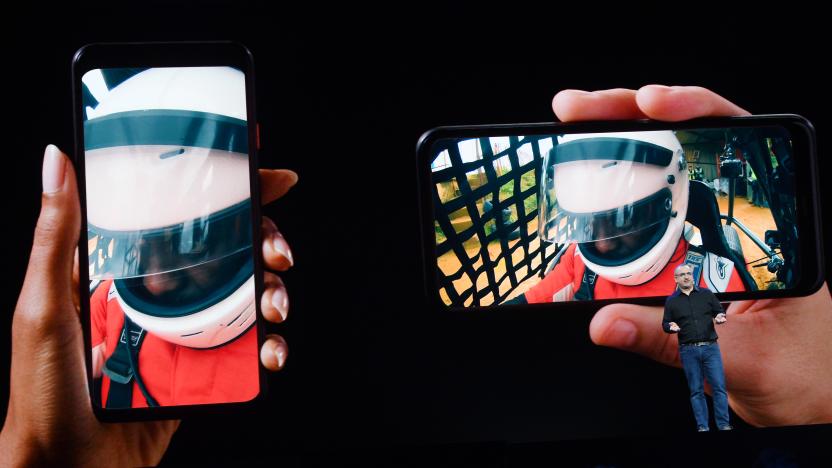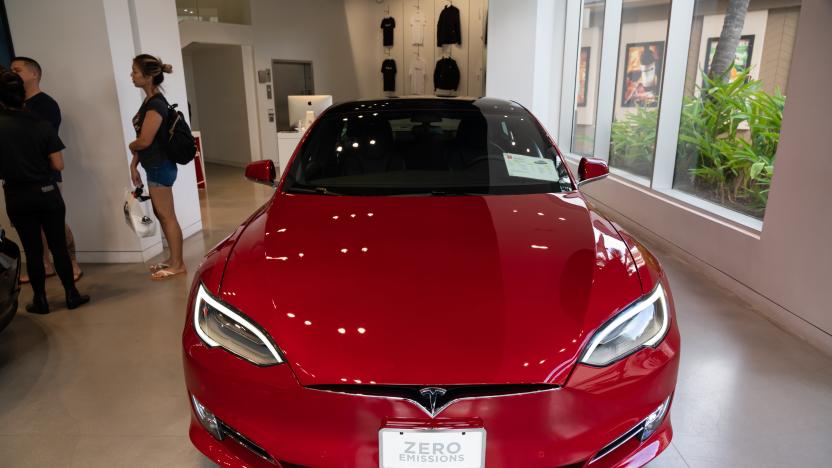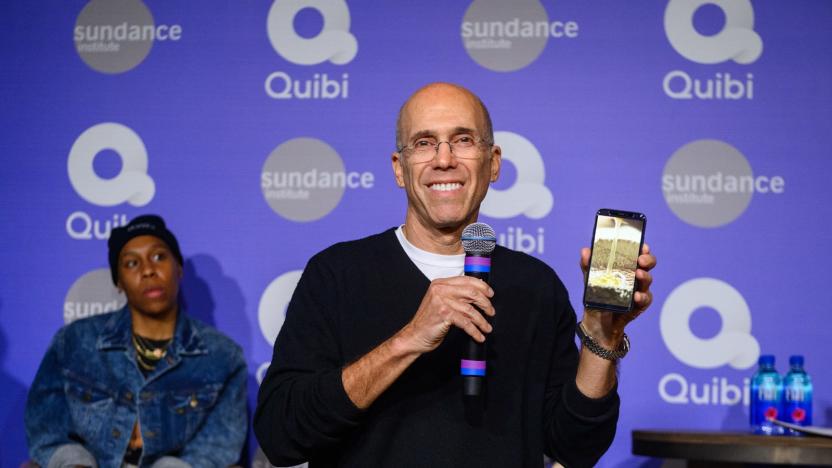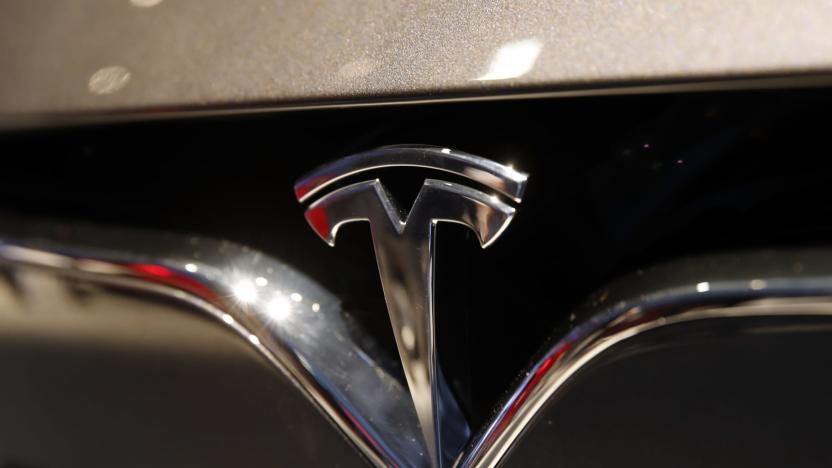trade secrets
Latest

Quibi will transfer its video tech to another company to settle lawsuit
The Turnstyle feature let users stream short-form videos in either portrait or landscape mode.

Self-driving startup Zoox settles with Tesla over trade secret theft
Zoox acknowledged that some new hires brought Tesla documents with them.

Quibi sued over patent infringement for its 'Turnstyle' video feature (updated)
The short-form, mobile video streaming platform Quibi is scheduled to launch on April 6th, but it's already facing a patent infringement dispute. Eko, a New York-based company that creates interactive videos, claims Quibi used patented tech and stolen trade secrets to develop its "Turnstyle" technology, The Wall Street Journal reports.

Huawei accuses US Justice Department of 'political persecution'
One day after the US Justice Department announced 16 new charges against Huawei, the Chinese telecommunications equipment manufacturer has responded. In a lengthy statement, the company defends its track record, and accuses the US government of "using the strength of an entire nation to come after a private company."

Justice Department charges Huawei with stealing trade secrets, again
The US Justice Department has charged Huawei and two US subsidiaries with racketeering conspiracy and conspiracy to steal trade secrets. A 16-count superseding indictment, filed yesterday in Brooklyn, New York, adds to previous US charges filed against Huawei last January. The indictment names several defendants, including Huawei's Chief Financial Officer Wanzhou Meng, who is already facing fraud accusations and could serve years in prison.

Hackers targeted BMW, Hyundai in hunt for trade secrets
Two of the world's larger car makers were the victims of a sophisticated (but still not very successful) hacking campaign. Bayerricscher Rundfunk has learned that intruders from the hacking group OceanLotus slipped into the networks of BMW and Hyundai in an attempt to find trade secrets. BMW, at least, found the hackers quickly -- instead, it let them operate for "months" to gather data before blocking them at the start of December. No sensitive data would have leaked out of BMW, according to an anonymous security expert, and the attackers wouldn't have breached the central data center in Munich.

Uber may have to pay Waymo or redesign its self-driving software
In 2017, Waymo accused Uber of stealing its autonomous driving trade secrets. You may have thought the Uber-Waymo legal battle was over when, in 2018, the companies reached a settlement and Uber agreed to pay around $245 million. But as part of the settlement, the parties brought in an independent software expert to review Uber's software and make sure it didn't misappropriate Waymo's intellectual property. Now, the review is complete, and Uber admits that the findings are not good.

Former Tesla employee admits to storing Autopilot source code on his own iCloud
A former Tesla employee is being sued for downloading data related to the company's Autopilot feature and allegedly taking that data to a Chinese rival company.

AMD denies improperly sharing CPU tech with China
AMD has been accused of feeding sensitive technology to China, and the company isn't having any of it. The chip designer has rejected Wall Street Journal claims that partnerships formed in early 2016 improperly shared x86 CPU tech with Sugon Information Industry, a supercomputer maker backed by the Chinese government. Sources talking to the WSJ alleged that AMD created a "complex structure" between two joint ventures to bypass American rules, with the Commerce and Defense Departments both raising concerns that the arrangement threatened national security. AMD, however, told a different story.

Tesla alleges self-driving car startup Zoox stole company secrets
Tesla filed a lawsuit this week against four former employees for allegedly stealing trade secrets and providing them to a rival company. According to the complaint filed with the US district court for Northern California, the ex-Tesla workers gave confidential information to autonomous vehicle start-up Zoox. The documents allegedly allowed the company to accelerate the development of its technology by cribbing off of Tesla's proprietary work.

Ex-Microsoft employee who leaked company secrets sentenced to three months in prison
Remember that time Microsoft rifled through someone's Hotmail account and then claimed it was totally OK? The incident -- and Microsoft's response -- was disturbing enough that it was easy to forget why the company accessed someone's account in the first place. The reason: That inbox belonged to a French blogger who had posted Windows 8 screenshots. As a result of that email probe, Microsoft was able to identify the leaker he had been corresponding with, a former employee named Alex Kibkalo who was then arrested for stealing trade secrets. Kibkalo plead guilty and now, three months later, he's been sentenced: he will spend three months in prison (full ruling embedded below) Since the incident, Microsoft has vowed to follow stricter policies during investigations, though it stands by its actions in this particular case.

Paypal v. Google: a tawdry tale of trade secret misappropriation
Google and its poached Paypal employees got sued for trade secret misappropriation yesterday, but we didn't know the dirty details until now. A peek at PayPal's complaint reveals there's a bit more to the story. Apparently, Paypal and Google were in talks last year to use PayPal for payments in the Android Market. Osama Bedier was in charge of those negotiations for PayPal in October of 2010, when the deal was supposed to close, but was allegedly interviewing for a mobile payment position at Google at the same time (holy conflict of interest, Batman!). The complaint claims that Bedier initially rebuffed El Goog's advances, told PayPal of the job offer and professed that he would stay, but jumped ship a month later (bringing some PayPal coworkers with him) after being recruited by Stephanie Tilenius and the almighty dollar. Once it hired Osama, Google reportedly put the brakes on the PayPal deal and created Google Wallet. Then Google, Bedier, and Tilenius got slapped with a lawsuit. A brief rundown of the legal claims awaits you after the break.

PayPal swiftly slaps Google with mobile payment suit
Just this morning we reported on the rather jovial atmosphere at Google's big mobile payment announcement -- well, it looks like PayPal's prepared to bring an end to the celebration. According to Bloomberg, PayPal filed a suit against Google today in a California Superior Court, alleging that former PayPal executive, and one of this morning's MCs, Osama Bedier misappropriated the company's trade secrets. The suit further fingered Stephanie Tilenius, also formerly with PayPal, of violating the terms of her contract in recruiting Bedier. Though we've yet to get our hands on any clear details about which trade secrets PayPal's pointing to, we'd say the timing speaks volumes.

VoIP Inc. sues Google: alleges theft of trade secrets for click-to-call ads
Google's no stranger to the courtroom, and while their litigation with Oracle and Viacom has gotten all the publicity of late, VoIP Inc. -- perhaps in a move to help pay off its bankruptcy creditors -- has joined in the litigious fun by suing the search giant for stealing trade secrets. VoIP alleges Google entered a license agreement with one of its subsidiaries in 2005 for technology that allows users to click online ads to call the advertiser directly over the internet -- because, you know, the unwashed masses are just dying to chat with the makers of PajamaJeans. Google later said that VoIP violated its nondisclosure agreement by talking about the deal and killed the relationship, but VoIP claims the boys and girls in Mountain View used its tech to create click-to-call ads in a 2006 deal with eBay and Skype. The litigation is just getting started, so we've yet to see the complaint or Google's response, but we feel certain VoIP has asked for a princely sum as punishment for these transgressions. Time will tell if Google decides to cut a check, so stay tuned.

Motorola sues Huawei and several former employees for stealing wireless trade secrets
Man, if you thought the lawsuit action in the mobile space was crazy before, well, you ain't seen nothing yet -- Motorola just sued Huawei and over a dozen former employees for conspiring to steal its wireless trade secrets and other proprietary technology over a period of years starting in 2001. Yeah, it's crazy. The lawsuit was originally filed in 2008 against four former Motorola engineers and a company called Lemko, all of whom Motorola accused of conspiring to stealing trade secrets related to wireless technology. After years of discovery in the case, it appears that Motorola realized the conspiracy went much deeper than it originally thought, leading the company to file a new complaint on July 16th, in which it named Huawei and nine additional former employees, who allegedly schemed to steal plans for a 3G base station called the SC300. According to the complaint, part of the scheme was ultimately blown up when one of the employees was arrested by Customs at O'Hare airport en route to China with $30,000 in cash and over 1,000 pages of documentation regarding Motorola's various communications networking tech, while another employee was caught buying Motorola phones in bulk and sending unlock codes and dump files to Lemko for reverse engineering purposes. Motorola also says that it doesn't yet know the exact relationship between Lemko, Huawei and some of the former employees because "file destruction software" was installed and run on computers before they were turned over as evidence, but the company claims that Huawei was aware it was receiving proprietary Motorola information the entire time it was in contact with the former employees. Yes, it's all very juicy -- we'll be watching this one closely.

Apple: What iPad freight records?
Philip Elmer-DeWitt over at Apple 2.0 is reporting that Apple has taken steps to hide ocean shipping data for its iPad. Several business intelligence companies exist that collect, analyze, and resell data of a company's shipping records. This data is sold to the company's competitors in hope that they can glean information on how well a certain product is doing by extrapolating potential sales data from the shipping records. Companies like Trade Privacy also exist to protect trade data. Trade Privacy has stated that in anticipation of the March iPad launch, Apple has blocked its bills of lading and other import records from public access. "Apple is the only major electronics company so far to have protected their import data," Trade Privacy CEO Andrew Park told DeWitt. "Similar companies like Microsoft, Sony and Google continue to import with their product data exposed to the public." It's unclear whether Apple is a Trade Privacy client or if Trade Privacy just has knowledge of Apple's steps to retain its iPad shipping privacy. Apple was reportedly alarmed two years ago by media reports that predicted the arrival of the iPhone 3G before it had been announced based on data from Import Genius – a firm that collects business intelligence data on a company's shipping records and resells that data to competitors. "Apple was caught off guard and took swift action to protect their trade-secrets from competitors," Park told DeWitt. Given Apple's history of cloak and dagger tactics, safeguarding its shipping data for the much-hyped iPad should surprise few.

Ex-Intel employee busted for trying to take secrets to AMD
Another day, another disgruntled ex-employee trying to schelp stolen trade secrets. This time it's a former Intel engineer named Biswahoman Pani, who nabbed 13 files containing over 100 pages of internal Intel design documents drawings on his way to a new gig at AMD. The FBI got involved when another Intel employee noticed some funny business on system access logs, but so far Biswahoman has denied everything -- although his passport's been confiscated and he never got to take that AMD job. Crime don't pay, kids.

Former HP exec pleads guilty to stealing IBM trade secrets
Well, that didn't take long. Atul Malhotra, the HP executive charged with stealing printer market data when he left IBM and sending it to his new colleagues at HP with the genius-level subject line "For Your Eyes Only," has pled guilty to one count of theft of trade secrets. Malhotra probably made the right choice -- he specifically requested the information just before he left IBM and HP itself investigated and turned him in when he was found sending it around, so the case against him was pretty airtight. It's not clear what his plea deal is, but sentencing is scheduled for October 29, and he can get up to 10 years in the clink with a fine of up to a quarter-million dollars. Crime don't pay, kids.

Former HP VP charged with stealing IBM trade secrets
The printer market isn't exactly full of the most interesting news, but it's still big money, and big money tends to bring out the worst in people -- like former HP VP Atul Malhotra, who was just charged with stealing trade secrets from his former employer IBM and emailing them to other HP execs. Apparently Malhotra requested some confidential sales data two months before he went from the three-letter company to the two-letter one, and when he got there he hit up some other senior execs with the files -- marking the subject line "For Your Eyes Only." Yeah, that's an effective way to keep a lid on things. Malhotra was fired from HP in 2006, so all this went down some time ago, and HP says it actually conducted an internal investigation about the matter before firing Malhotra and reporting the theft to both IBM and the authorities. Sure, sure -- but we'll know what's up when the next HP AIO is running a Cell chip.

Posdata employee tried to sell WiBro secrets to US
While it may look easy (and astonishingly lucrative) to pull a case of high-stakes espionage, one South Korean and three US-based individuals are learning the hard way that crime doesn't pay. The Seoul Central Prosecutors Office is accusing an unnamed employee of Posdata Co., a developer of WiBro, "of sending email with proprietary information to three former employees who live in the US." Additionally, it was suggested that the trade secrets (which cost about $95 million to fully develop) were being offered up "for around $190 million" to an unnamed US company. All in all, four culprits were arrested in the ordeal, and while "some data" was transferred, the boys in blue caught on and stopped the gig before any major secrets were divulged. Should've tried the bag drop method, eh?










